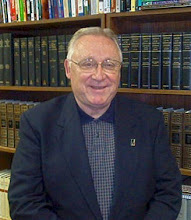Preaching has fallen on hard times. Attend a service in the current church culture in America and you may encounter Drama, Dance, Mime, Choreographed productions, Videos and the list goes on. There is a high probability that what you will NOT find is Preaching That Transforms.
There are those who would celebrate this condition. They would claim that preaching is an anachronistic endeavor no longer applicable or appropriate for the church of the 21st century. There are those who would claim to be "preaching", but what they are engaged in is a discussion about the Bible, but not the proclamation of the Truth claims of the text. My focus in this brief article is to champion the glorious art of preaching that God has used over the centuries to Transform His people - - preach the word (2 Tim. 4:2). To accomplish this end I offer the following definitions to guide our thinking.
•Preaching is "the communication of Truth through personality" (Phillips Brooks). Brooks described the ministry as "the noblest and most glorious calling to which a man can give himself."
•Transformation - is the objective and observable positive change in the life of a disciple into the character and likeness of Jesus Christ.
•Disciple - is a Believer who is becoming more like Christ. Their Transformation is consistent, objective and measurable. Transformation comes from the study of the Scriptures, applying the precepts and principles in daily living, and imitating the life of a disciple as modeled by mature believers. There is a deliberate and intentional effort to obey all that Christ has commanded (Matt. 28:19-20).
To accomplish transformation and make disciples fully formed in the image of Christ the following four (4) factors are essential to preach with an effectiveness that transforms.
Authority - the Bible must be recognized as the Word of God. It is His Special Revelation of His person and purpose in securing a people for Himself out of every tribe and tongue and nation. Christ actually accomplished redemption for sinners. He came to save. It is Truth Absolute.
History - The unfolding events recorded in the text are the Drama of Redemption. Every artifact unearthed by the archeologist confirms the accuracy and reliability of the text. Yes Virginia, there really is a Xerxes! The Bible is reliable history.
Exegesis - Words and their relationships give meaning to language. God chose to communicate with words. The Masoretic text of the OT and the Koine' Greek of the NT are dead languages, the meaning of words does not change. When we exercise the discipline to understand with accuracy what the text is saying, we know with certainty what God designed for our good and His glory.
Application - The preacher must guide the listener into an understanding of the historical context revealed in the text. He then must make proper and legitimate application of that revelation to life in the 21st century. Technology is exploding the parameters of scientific understanding. Cultures differ across geographic landscapes. However, the revelation of our God to mankind is binding upon all people for all time. It is the joyful privilege of the exegete to unfold the text and its application to life today. We lead God's people to obey all that Jesus has commanded and to find His Grace abundant and infinite.
"It is an enormous privilege to be called to preach in the contemporary world, to be a biblical expositor! For one then stands in the pulpit, with God's Word in his hands, God's Spirit in his heart, God's people before his eyes, waiting expectantly for God's voice to be heard and obeyed." (John Stott, Christian Preaching in the Contemporary World).
So pastor, what is your transformation quotient? God is our judge, but are you striving to communicate the Truth, the revelation of God that will bring about transformation in the flock entrusted to you?
Subscribe to:
Post Comments (Atom)


No comments:
Post a Comment